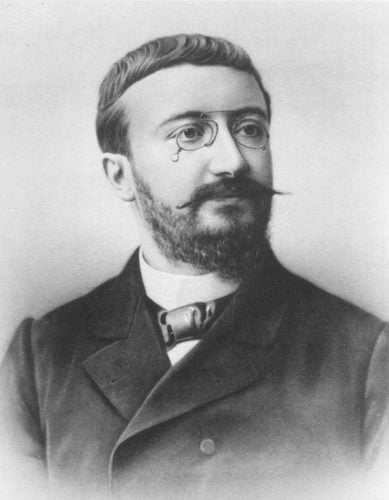
Alfred Binet’s most significant contribution to the field of child psychology was the development of the first intelligence test. But there’s more.
Short biography
Alfred Binet was born Alfredo Binetti in Nice, France, on July 8, 1857. His father, a physician, and his mother, an artist, divorced when he was young, and Binet then moved to Paris with his mother. He received a law degree in 1878 but became interested in psychology in 1880.
Binet did not receive any formal graduate training in psychology. His first appointment was in a French laboratory, the Salêptrière, conducting research on hypnosis under the supervision of Jean Charcot. In 1890 Binet rejected Charcot’s theories and began research on cognition at the Sorbonne’s Laboratory of Physiological Psychology. In 1894 Binet became laboratory director, where he worked until he died in 1911.
The unifying theme of Binet’s research was examining individual differences and similarities in cognition. Binet studied a range of populations, including children, mental hospital patients, and professional artists. His research topics were also wide-ranging, including studies of consciousness, sensation, creativity, language development, memory development, and mental fatigue.
Intelligence testing
Binet’s most influential contributions to the field of psychology were in the area of intelligence testing. In contrast to his contemporaries, who supported the measurement of physical features or a single factor as an assessment of intelligence, Binet supported a functional, multidimensional view of intelligence that emphasized reasoning and comprehension.
Because of his unique approach to studying intelligence, the Paris school system asked Binet to develop a test that could be used to identify children who would benefit from special education classes. In 1905 Binet and his collaborator, Théodore Simon, responded to this request by creating the first intelligence test, the Binet-Simon Scale.
Binet revised the scale in 1908 and again in 1911. The Binet-Simon scale was and is hugely popular worldwide, mainly because of the vast literature it has fostered, as well as its relative ease of administration.
Lewis Terman later revised the scale and standardized the test with subjects drawn from an American sample. This test became known as the Stanford-Binet Intelligence Scales and is still widely used today.
While Binet’s original intent was to use the test to identify children who needed additional academic assistance, the test soon became a means to identify those deemed “feeble-minded” by the eugenics movement. Eugenics was the belief that the human population could be genetically improved by controlling who was allowed to have children. By doing this, the eugenicists believed they could produce more desirable inherited characteristics.
Researching cognitive development
The second focus of Binet’s research was the cognitive development of his two daughters, Alice and Madeleine. His extensive observations and experimental studies of his daughters allowed him to develop several theories about cognitive development.
Binet believed that the purpose of cognitive development is to allow children to adapt to their environment’s physical and social demands, emphasizing that children learn by assimilating new experiences into their existing ways of thinking.
In the 21 years following his shift in career interests, Binet published more than 200 books, articles, and reviews in what now would be called experimental, developmental, educational, social, and differential psychology.
Bergin and Cizek (2001) suggest that these works may have influenced Jean Piaget, who later studied with Binet’s collaborator Théodore Simon in 1920. Binet’s research with his daughters helped him to refine his developing conception of intelligence, especially the importance of attention span and suggestibility in intellectual development.
An important milestone in Binet’s career was the creation of the first laboratory, the Laboratory of Experimental Pedagogy, based in a European school for young children. The purpose of this laboratory was to develop a systematic line of experimental research with children and to provide training for teachers on how to educate children with intellectual disabilities. The establishment of this laboratory was a major event in the formation of the field of child psychology.
Binet and chess
Binet had done a series of experiments to see how well chess players played when blindfolded. He found that only some master chess players could play from memory, and a few could play multiple games simultaneously without looking at the boards.
To remember the positions of the pieces on the boards, some players envisioned exact replicas of specific chess sets, while others envisioned an abstract schema of the game. Binet concluded that extraordinary feats of memory, such as blind chess playing, could take various mnemonic forms. He recounted his experiments in a book entitled Psychologie des grands calculateurs et joueurs en echec.
Honored by many
In addition to Binet’s considerable direct contributions to the field of psychology, his work has also influenced the research of subsequent generations of child psychologists.
Since his death, many people in many ways have honored Binet, but two of these stand out. In 1917, the Free Society for the Psychological Study of the Child, of which Binet became a member in 1899 and which prompted his development of intelligence tests, changed its name to La Société Alfred Binet, in memory of the renowned psychologist.
The second honor was not until 1984 when the journal Science 84 picked the Binet-Simon scale as one of twenty of the century’s most significant developments or discoveries.
.

